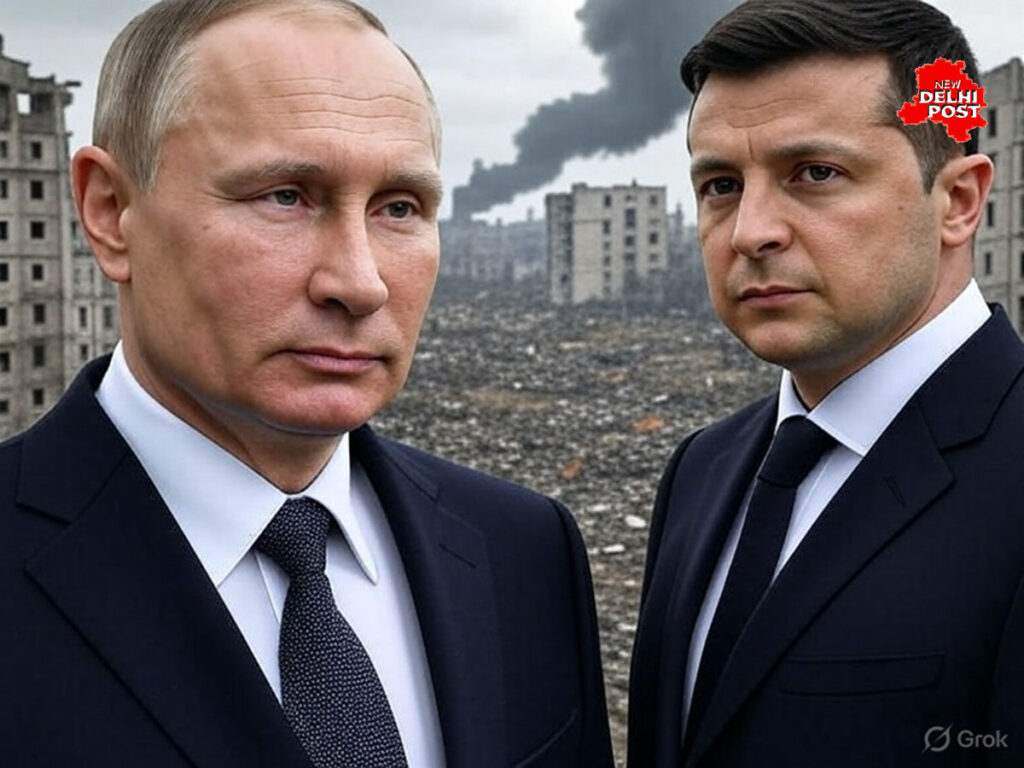Russian President Vladimir Putin’s calculated response to Ukrainian attacks has escalated the conflict, with Russian forces seizing multiple cities and unleashing widespread destruction across Ukraine.
Kyiv, Ukraine: The war in Ukraine has taken a grim turn as Russian President Vladimir Putin adopts a selective yet aggressive retaliation strategy against Ukrainian military actions. Russian forces have intensified their offensives, targeting key urban centers and infrastructure, leaving a trail of destruction in their wake. The escalation follows Ukrainian drone and missile strikes on Russian military bases, prompting Moscow to respond with overwhelming force.
Targeted City Seizures
Russian troops have seized several cities in Ukraine’s eastern and southeastern regions, particularly in Donetsk, where over 4,000 square kilometers of territory have been captured since last fall. The city of Bakhmut, a focal point of intense fighting, has seen Russian forces, including Wagner group fighters, push to consolidate control after months of setbacks. Ukrainian officials report that Russian tactics involve heavy artillery barrages and airstrikes, aimed at crippling resistance and infrastructure before ground assaults. “Russian killers continue their war against residential buildings, ordinary cities, and people,” said Ukrainian President Volodymyr Zelenskyy, condemning the attacks on civilian areas.
Widespread Destruction and Civilian Toll
The Russian onslaught has caused significant civilian casualties and damage. In the past week alone, over 30 Ukrainians have been killed and 163 injured in drone and missile attacks across more than 30 cities, including Kyiv, Zhytomyr, and Khmelnytskyi. A devastating strike in Zhytomyr claimed the lives of three siblings, aged 8, 12, and 17, highlighting the human cost of the conflict. Ukrainian Interior Minister Ihor Klymenko described the attacks as “combined, ruthless strikes aimed at civilians,” with over 80 residential buildings damaged and 27 fires reported. The destruction of energy infrastructure, including Ukraine’s largest hydroelectric plant, has left over a million people without power.
Putin’s Retaliatory Motives
Western intelligence suggests Putin’s actions are a response to Ukrainian strikes on Russian airbases and infrastructure, such as the Kerch Bridge linking Russia to occupied Crimea. A recent Ukrainian operation, dubbed “Spider Web,” destroyed several Russian strategic bombers, infuriating Moscow. Kremlin spokesman Dmitry Peskov claimed the attacks were retaliation for Ukrainian “terrorist acts,” while Putin has threatened further “destruction” if Ukraine continues its counteroffensives. Experts believe Russia is also escalating to strengthen its position ahead of peace talks in Istanbul, where no major breakthroughs have been achieved.
Global Reactions and Strategic Implications
The international community has voiced alarm over the escalation. U.S. President Donald Trump, who recently spoke with Putin, called the Russian leader’s actions “crazy” and criticized the “needless killing.” However, Trump’s softer stance on Russia has strained relations with Ukraine and NATO allies. A study by the Council on Foreign Relations notes that Russia’s fall and winter campaigns have pushed deeper into Ukraine, despite earlier failures in Kharkiv. Putin’s modification of Russia’s nuclear doctrine in November 2024, allowing nuclear retaliation for conventional attacks by a nuclear state’s ally, has further raised fears of escalation. Ukrainian forces, bolstered by $407 billion in aid since 2022, continue to resist, with drone attacks on Russian targets showcasing their resilience.
Humanitarian Crisis Deepens
The United Nations reports that 3.7 million Ukrainians are internally displaced, with 6.9 million having fled the country. Over 12.7 million people require humanitarian assistance as Russian bombardments target civilian infrastructure. Zelenskyy has called for stronger sanctions and defense assistance, accusing the global community of “silence” that “encourages Putin.” Meanwhile, prisoner exchanges, including a recent swap of 390 soldiers and civilians, offer a glimmer of hope, but the intensifying violence overshadows diplomatic efforts.


